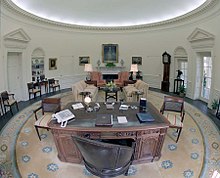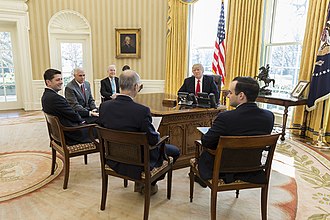The threat to world
对世界贸易的威胁
The rules-based system is in grave(严重的) danger
基于规则的体系岌岌可危
DONALD TRUMP is hardly the first American president to slap(掴) unilateral tariffs on imports. Every inhabitant of the Oval Office since Jimmy Carter has imposed some kind of protectionist curbs(限制、交易控制)on trade, often on steel. Nor will Mr Trump’s vow to put 25% tariffs on steel and 10% on aluminium by themselves wreck the economy: they account for 2% of last year’s $2.4trn of goods imports, or 0.2% of GDP. If this were the extent of(…的程度) Mr Trump’s protectionism, it would simply be an act of senseless self-harm. In fact, it is a potential disaster—both for America and for the world economy.
特朗普不是第一个单方面加征进口关税的美国总统。自卡特以来,椭圆办公室的每一任主人都实施过一些贸易保护主义措施,通常是针对钢铁行业。特朗普誓言对钢铁征收25%的关税,对铝征收10%的关税,这本身也不会对经济造成什么损害:钢铁和铝仅占去年1.4万亿美进口商品总额的2%,占GDP的0.2%。如果特朗普的保护主义到此为止,那只会是一种无意义的自残行为。但实际上,这对美国和世界经济都可能是一场灾难。
the Oval Office 美国总统办公室
Presidents generally decorate the office to suit their personal taste, choosing new furniture, new drapery, and designing their own oval-shaped carpet to take up most of the floor.
美国总统会按照自己的风格装饰办公室,其中有一个就是 oval-shaped carpet 椭圆形的地毯 覆盖着整个地面。估计 oval office 是因为这个巨大的椭圆形地毯而得名


As yet it is unclear exactly what Mr Trump will do (see Briefing). But the omens are bad. Unlike his predecessors, Mr Trump is a long-standing sceptic of free trade. He has sneered at the multilateral trading system, which he sees as a bad deal for America. His administration is chaotic, and Gary Cohn’s ominous(不吉利的) decision on March 6th to resign as the president’s chief economic adviser deprives the White House of a rare free-trader, signalling that it has fallen into protectionist hands. Not since its inception(开端) at the end of the second world war has the global trading system faced such
目前尚不清楚特朗普到底会做什么,但前景不妙。与历任美国总统不同,特朗普一直对自由贸易持怀疑态度。 他对多边贸易体系嗤之以鼻,认为该体系令美国受到了不公正的待遇。他的政府混乱无序,而本月6日加里*科恩又做出了一个让人感觉不妙的决定:辞去总统首席经济顾问一职。这下白宫内本就稀有的自由贸易支持者又少了一人,表明这届政府已成为贸易保护主义者的天下。全球贸易体系自二战后建立以来从未面临过这样的危险。
Rough trade
贸易乱战
This danger has several dimensions. One is the risk of tit-for-tatescalation. After the EU said it would retaliate(报复反击)with sanctions(制裁) on American goods, including bourbon and Harley- Davidson motorbikes, Mr Trump threatened exports of European cars.
危险表现在几方面。一是以牙还牙的报复行动有升级的风险。在欧盟表示要对波本威士忌、哈雷摩托车等美国商品实施反制措施后,特朗普威胁要向欧盟出口的汽车征税。
The second danger springs from Mr Trump’s rationale. The tariffs are based on a little-used law that lets a president protect industry on grounds of national security. That excuse is self-evidently spurious. Most of America’s imports of steel come from Canada, the European Union, Mexico and South Korea, America’s allies. Canada and Mexico look set to be temporarily excluded—but only because Mr Trump wants leverage in his renegotiation of the North American Free-Trade Agreement, which has nothing to do with national security. Mr Trump is setting a precedent that other countries are sure to exploit to protect their own producers, just as spuriously.
第二个危险来自特朗普的行动依据。此番征收关税的依据是一项极少援引的法律:总统可以以国家安全为由保护工业。这个理由显然站不住脚。美国进口的钢材大部分来自它的盟友,如加拿大、欧盟、墨西哥和韩国。加拿大和墨西哥看起来暂时会得到豁免,但这只是因为特朗普希望在重新谈判《北美自由贸易协定》时有筹码在手,与国家安全毫无关联。特朗普开创了一个先例,今后其他国家势必效仿,以同样难以成立的理由来保护本国生产商。
It is not clear whether other countries can respond legally when national security is invoked in this way. This puts the World Trade Organisation (WTO) into a rat trap. Either Mr Trump will provoke a free-for-all(混战) of recrimination and retaliation that the WTO’s courts cannot adjudicate, or the courts will second-guess(事后批评) America’s national- security needs, in which case Mr Trump may storm out of the organisation altogether.
美国此番搬出国家安全的名义,其他国家是否可以诉诸法律仲裁目前尚不清楚。世贸组织陷入了窘境。要么是特朗普将引发一场互相指责和拫复的混战,令世贸组织的法庭无法裁决;要么法庭对美国的国家安全需求做事后批评,在这 种情况下,特朗普可能会愤然退出该组织。
Mr Trump has lobbed his grenade as the WTO is already under strain. The collapse of the Doha round of trade talks in 2015, after 14 fruitless years, put needed reforms on hold indefinitely. Disputes that might have been swept into a new trade round have fallen to the WTO’s dispute-resolution machinery(机制), which is too slow and too frail(虚弱脆弱) to carry the burden. The WTO has not kept pace with economic change. Investment is increasingly tied up in intangibles(无形的), such as patents and copyright, rather than physical assets, such as steel mills. Rules drafted for rich, market-led economies cannot always police state capitalism. The implicit subsidies China gives its producers were a cause of global gluts(过剩) in industrial metals. No wonder that the world’s second-biggest economy has been the focus of so much anger.
朗普扔出这枚手榴弹之际,世贸组织本巳承受重压。经过14年没有成果的会谈后,2015年多哈回合贸易谈判破裂,令必需的改革无限期搁置。一些争端本可能会进入新一轮贸易谈判,然而世贸组织的争端解决机制太过缓慢和脆弱,无法承担此重负。世贸组织没有跟上经济变化的步伐。投资越来越多地和专利、版权这样的无无形资产联系在一起,而不是像钢铁厂这样的有形资产。为市场主导的富裕经济体制定的规则并不总能管制国家资本主义。中国向其生产商提供的隐性补贴是导致全球工业金属过剩的原因之一。难怪这个世界第二大经济体 已经成为众矢之的
Whatever the WTO’s problems, it would be a tragedy to undermine(破坏) it. If America pursues a mercantilist(重商主义) trade policy in defiance of the global trading system, other countries are bound to follow. That might not lead to an immediate collapse of the WTO, but it would gradually erode one of the foundations of the globalised economy.
无论世贸组织有怎样的问题,破坏它都将酿成一场悲剧。如果美国无视全球贸易体系,奉行重商主义的贸政策,其他国家肯定会效仿。这可能不会导致世贸组织立即崩溃,但会逐渐侵蚀全球化经济的一大根基。
Everyone would suffer.
Mr Trump seems to think trade is a zero-sum affair, in which a deficit is a sign of a bad deal.
谁的曰子都不会好过。
特朗普似乎认为贸易是一种零和活动,而赤字是糟糕交易的信号。